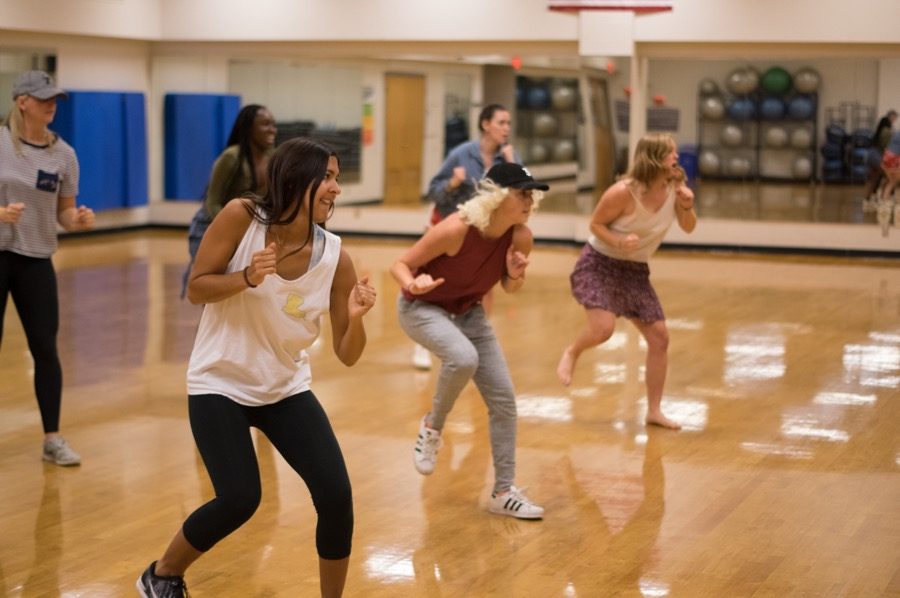Dat Dance Crew provides platform for hip-hop performance
One major draw for prospective Tulane students is the vibrancy of New Orleans and local arts. From the numerous art galleries spread throughout downtown to the annual New Orleans Jazz and Heritage Festival, the city is full of culture. Dance culture, however, is seen by some as moderately underrepresented in New Orleans.
Dat Dance Crew, a recreational and performing hip-hop dance team, wants to enliven the local dance scene. Junior Andrea Burns founded the group in spring 2015 and currently serves as the group’s president. Its next performance will be at 6:30 p.m. Tuesday in Brandt V.B. Dixon Hall.
Coming to New Orleans, Burns was disappointed to find the city lacked a strong hip-hop dance network.
“There’s maybe two or three studios in New Orleans, which is really small considering the population size and that [the city] is considered such a cultural center for the arts,” Burns said. “That was pretty devastating to me.”
Burns found while the dance studios in New Orleans are excellent, they tend to focus on modern and ballet over hip-hop. Additionally, they often lack the resources of dance studios in cities like New York, Burns’ hometown.
Hip-hop dance options on campus are similarly limited. Burns founded DDC as an alternative to Shockwave, Tulane’s competitive dance team, and Tulane Central City Dance Team, an organization that offers free dance classes to New Orleans youth. Burns said she believes that she and other students would benefit from a lower time commitment alternative that focused on hip-hop dance. DDC is more accepting of beginners and only meets for an hour and a half every Sunday to practice dance routines.
The club may supplement dance classes at Tulane or provide a less stressful way to learn dance.
“Taking dance classes at Tulane is great, but they are a much bigger time and work commitment,” junior Dana Sarfaty said. “DDC is the perfect place to sharpen and practice my dance skills.”
Rehearsal is dedicated to preparing for performances, which occur twice per semester. One performance is live, and the other is filmed for promotional purposes.
DDC will perform with the African, jazz and Brazilian classes in Tulane’s dance department. In the future, DDC hopes to host its events besides joining Tulane events, but to do this, it needs to become more established.
“It would be amazing if the club grew bigger and stronger,” Sarfaty said. “I would like to see us perform more often at bigger venues and for the club to be well known around Tulane’s campus.”
The club, however, is already making an impact on the school’s dance culture. In addition to enlivening the dance scene on campus, Burns hopes to validate hip-hop as a form of dance.
“I think people think hip-hop is really great but don’t appreciate it as an art form the same way with ballet or modern,” Burns said. “That’s been something I’ve struggled with my entire life.”
Hip-hop dance, like modern dance and ballet, has a rich history and deep cultural roots. Its moves can be precise and carefully choreographed, but the style also adapts well to experimentation and freestyle. Virtually any body movement can be implemented into performance, creating a fun and accepting environment.
Because of the prevalence of hip-hop and pop songs in modern culture, Burns also believes that hip-hop can be more fun and relevant than other dance styles.
“I think that [hip-hop is] more fun because of the music you can dance to, and I think it’s much more of a relevant aspect of our culture, especially as millennials and the music that we listen to growing up,” Burns said.
Learning hip-hop doesn’t just have practical value in social situations. Burns also hopes to spread the joy of dance.
Auditions are held at the beginning of each semester. For more information, email Andrea Burns at [email protected].
Leave a Comment
Your donation will support the student journalists of Tulane University. Your contribution will allow us to purchase equipment and cover our annual website hosting costs.




Carly Saada • Dec 2, 2019 at 3:59 pm
if i don’t dance hip hop, I’m gonna have anxiety.
Carly Saada • Dec 2, 2019 at 3:59 pm
if i dont dance hip hop, im gonna have anxiety.